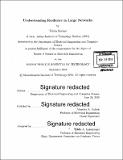Understanding resilience in large networks
Author(s)
Sarkar, Tuhin
DownloadFull printable version (3.424Mb)
Other Contributors
Massachusetts Institute of Technology. Department of Electrical Engineering and Computer Science.
Advisor
Munther A. Dahleh.
Terms of use
Metadata
Show full item recordAbstract
This thesis focuses on the analysis of robustness in large interconnected networks. Many real life systems in transportation, economics, finance and social sciences can be represented as networks. The individual constituents, or nodes, of the network may represent vehicles in the case of vehicular platoons, production sectors in the case of economic networks, banks in the case of financial sector, or people in the case of social networks. Due to interconnections between constituents in these networks, a disturbance to any one of the constituents of the network may propagate to other nodes of the network. In any stable network, an incident noise, or disturbance, to any node of the network eventually fades away. However, in most real life situations, the object of interest is a finite time analysis of individual node behavior in response to input shocks, or noise, i.e., how the effect of an incident disturbance fades away with time. Such transient behavior depends heavily on the interconnections between the nodes of the network. In this thesis we build a framework to assess the transient behavior of large interconnected networks. Based on this formulation, we categorize each network into one of two broad classes - resilient or fragile. Intuitively, a network is resilient if the transient trajectory of every node of the network remains sufficiently close to the equilibrium, even as the network dimension grows. This is different from standard notion of stability wherein the trajectory excursion may grow arbitrarily with the network size. In order to quantify these transient excursions, we introduce a new notion of resilience that explicitly captures the effect of network interconnections on the resilience properties of the network. We further show that the framework presented here generalizes notions of robustness studied in many other applications, e.g., economic input-output production networks, vehicular platoons and consensus networks. The main contribution of this thesis is that it builds a general framework to study resilience in arbitrary networks, thus aiding in more robust network design.
Description
Thesis: S.M. in Electrical Engineering, Massachusetts Institute of Technology, Department of Electrical Engineering and Computer Science, 2016. Cataloged from PDF version of thesis. Includes bibliographical references (pages 63-64).
Date issued
2016Department
Massachusetts Institute of Technology. Department of Electrical Engineering and Computer SciencePublisher
Massachusetts Institute of Technology
Keywords
Electrical Engineering and Computer Science.